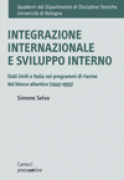Integrazione internazionale e sviluppo interno

Through a detailed reconstruction of American rearmament programs to Italy from the birth of NATO through the implementation of multilateral military assistance during the early 1950s, this research challenges the idea that the end of reconstruction marked a striking American shift from economic aid to defense policies. The case study of Italy highlights the impact that the defense procurement contracts had both on monetary stability and balance of payments, as well as the integration of the Italian products within the infant European trade area. This monograph demonstrates that through military assistance the United States promoted balance of payments equilibrium and expansionary domestic aggregate demand to lay down the foundation of a mass consumption market. Furthermore, this work makes the point that the Italian elites resorted to Italy's industrial role as production source for NATO to both export manufactured products to the West European economies and import high added value instrumental goods from the U.S. markets.
Simone Selva holds a PhD in Contemporary European History from the University of Milan and a postdoctoral fellowship from the University of Bologna. A former associate fellow at Oxford University, he was visiting scholar at Columbia and Harvard Universities. His research interests revolve around the interplay between the process of international trade and monetary interdependence from Bretton Woods through the 1970s, and the twofold development of mass consumption markets and energy policies in the international relations system.